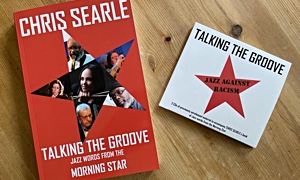Home » Jazz Articles » Book Review » I Put a Spell on You
I Put a Spell on You
 I Put a Spell on You
I Put a Spell on You Nina Simone with Stephen Cleary
Da Capo Books
ISBN: 0306813270
2003
When Nina Simone died earlier this year, the world lost one of its most memorable voices. She rose from a depression-era southern background to become not only “the high priestess of soul” but an important figure of the Civil Rights Movement during the 1960s. Fortunately, she left behind quite an impressive musical legacy, much of which is still available to the public. She also published an autobiography in 1992 entitled I Put a Spell on You, which has recently been reissued. Written with the help of British wrier, Stephen Cleary, Simone definitely provides an impressive memoir.
During her life, Simone rarely seemed to be at a loss for words. She managed to capture a substantial amount of feeling and power with her songs. Her autobiography offers a similar sense of strength as well, even though it never goes into lengthy discussions. While serious fans might hope for a slightly more substantial offering, I Put a Spell on You still delivers quite a compelling story.
Born Eunice Waymon in 1932, Simone grew up in a small North Carolina community. She discovered her musical talent at an early age and utilized it by playing organ in church. Religion provided the foundation of Simone’s household. In fact, her mother was a minister who felt that Eunice should exercise her skill within the context of religion. As Eunice grew, her musical skills developed exponentially. She studied classical music and also began finding out about life outside of the church. Her world seemed relatively happy. Then came one of her first recitals, when her parents were asked to sit in the back of the hall. Suddenly, she became aware of a culture filled with racist attitudes as well.
Eventually, she left North Carolina and began making a name for herself in the world of music. That name, however, wasn’t Eunice Waymon and the music was no longer sacred. In order to save her family from any possible embarrassment, Eunice began working under the pseudonym of Nina Simone. Before long, she developed an impressive following. She also made friends with quite an array of intellectuals such as Lorraine Hansberry, James Baldwin, Amiri Baraka, and Langston Hughes, to name a few.
After violent events in the 1960s, such as the murder of Medgar Evers, her intellectualism turned to activism. She used her music to offer a voice against the turbulence. Song such as “Young, Gifted and Black” practically became anthems. Her disillusionment with the state of American society, however, made her long for other horizons. Eventually, she left America to live first in Africa and later France.
I Put a Spell on You tells about every aspect of her interesting life. Unfortunately, it often does so with somewhat minimalist detail. It also centers more on her life than music. Obviously Simone led an extremely fascinating life, complete with husbands, lovers, famous friends, and incredible adventures. Of course, she also had an important musical career, which could have received more attention here. That aside, though, I Put a Spell on You does provide important material for anyone interested in learning more about Nina Simone. Perhaps this isn’t the definitive word on Nina Simone, but it’s definitely a good place to start.
< Previous
Threads
Next >
Fantasy Jazz, Volume 2
Comments
Tags
For the Love of Jazz
 All About Jazz has been a pillar of jazz since 1995, championing it as an art form and, more importantly, supporting the musicians who create it. Our enduring commitment has made "AAJ" one of the most culturally important websites of its kind, read by hundreds of thousands of fans, musicians and industry figures every month.
All About Jazz has been a pillar of jazz since 1995, championing it as an art form and, more importantly, supporting the musicians who create it. Our enduring commitment has made "AAJ" one of the most culturally important websites of its kind, read by hundreds of thousands of fans, musicians and industry figures every month.























